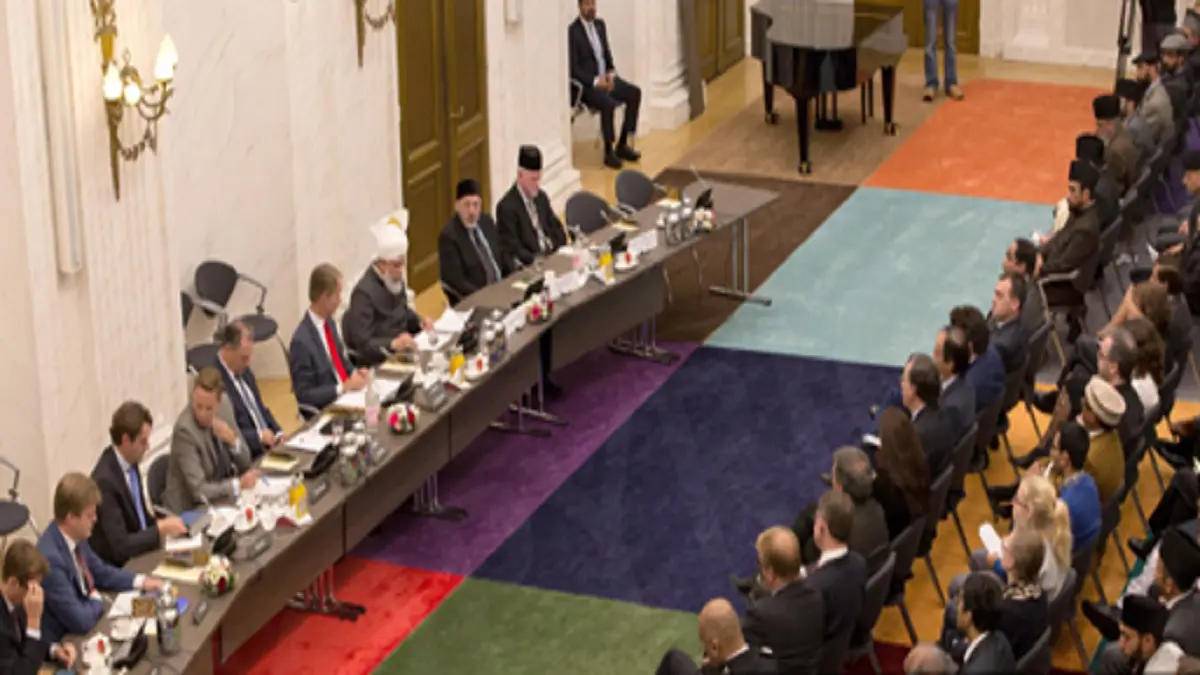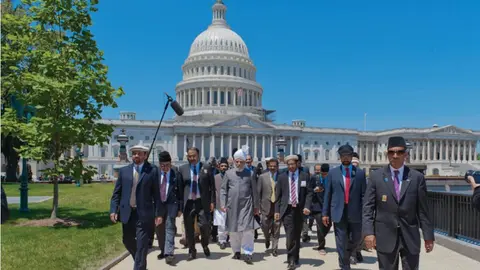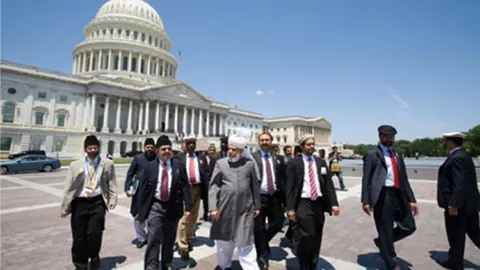World peace and security: the critical issues of our time (I)

Speech by His Holiness, Hazrat Mirza Masrur Ahmad at the National Parliament of the Netherlands.
6 October 2015 The Hague, The Netherlands.
On 6 October 2015 the International Leader of the Ahmadiyya Muslim Community, the Fifth Khalifa (Caliph), His Holiness Hazrat Mirza Masrur Ahmad, delivered a historic speech at a special session of the Standing Committee on Foreign Affairs of the National Parliament of the Netherlands in the country's capital, The Hague, before an audience of over a hundred dignitaries and other invited guests.
The formal session began with Mr Van Bommel's welcome address to His Holiness to the Parliament, who also introduced the members of the committee. He also welcomed several foreign parliamentarians, state ambassadors and other personalities representing the countries of Albania, Croatia, Ireland, Montenegro, Spain and Sweden.

The following is the keynote address delivered by His Holiness, Hazrat Mirza Masrur Ahmad.
Hazrat Mirza Masrur Ahmad, Khalifatul Masih V, said: "Bismillahir-Rahmanir-Rahim - In the name of Al'lah, the Gracious, the Merciful.
Distinguished guests, peace and blessings of Al'lah be upon you.
First of all, I would like to take this opportunity to express my sincere gratitude to the organisers of this event for their invitation to address this assembly.
It is worth noting that in today's world there is a continuous emphasis on certain issues that are described as the most important problems of our time. For example, some people highlight the threat of global warming and climate change. On the other hand, there are those who are deeply concerned about the escalation of various conflicts and the increasingly unstable state of the world. If we look at the situation objectively, we realise that the peace and security of the world is undoubtedly the most critical issue of our time.
There is no doubt that as each day passes, the world is becoming more and more unstable and dangerous due to a number of possible causes. For example, the financial crisis and economic instability that has affected many parts of the world are likely to be important factors.
Another possible root cause is the lack of justice exhibited by certain world leaders towards their own people and others. Another possible reason is that some religious leaders prioritise their own personal interests over the overall collective good and do not carry out their responsibilities with sincerity. With regard to international relations, a major source of conflict may lie in the gap between the rich and poor nations of the world.
It should be noted that great powers often try to take advantage of the natural resources of poor nations without giving back to them an adequate share of their own assets. There is thus a long list of possible causes contributing to the disturbance of world peace, some of which I have already mentioned. Whatever the causes, I am certain that the lack of peace in the world is the most pressing problem of this generation.
Having heard this, many of you will respond by saying that it is precisely in Muslim countries that we see the greatest instability and that the lack of peace in the world is rooted in the disorder in the Muslim world. Indeed, as the leader of one of the international Muslim communities - the Ahmadiyya Muslim Community - you may feel that I also bear some responsibility. They may also believe that the origin of extremist groups and the rise of terrorism is indeed inspired by Islamic teachings. However, it is totally unfair to associate Islam with such disorder and hatred.
I will not go into the history of religions in detail at this time, but suffice it to say that if you look objectively at the history of all religions, you will see that over time the followers of all religions departed from the original teachings, and internal divisions and conflicts arose. People were killed and grave cruelties were perpetrated. With this in mind, I for one accept without reservation that over time Muslims have also drifted away from the true Islamic teachings. This led to the development of frustrations and rivalries which in turn led to sectarianism, violence and injustice. However, from the perspective of a true Muslim, my faith has not diminished as I observe the desperate state of Islam today.
This is because over 1400 years ago the Founder of Islam, the Holy Prophet Muhammad (peace and blessings of God be upon him) prophesied that the teachings of Islam would gradually corrupt and Muslims would enter an age of moral decadence. However, he also announced that in such an age of spiritual darkness God Almighty would send a Reformer as the Promised Messiah and Imam Mahdi, to guide mankind back to the true and peaceful teachings of Islam.
As predicted by the Holy Prophet (pbuh), the Promised Messiah (peace be upon him) enlightened us with the original, totally peaceful teachings of Islam. Thus, we, the Muslim Ahmadis, are not among those who create or participate in today's disorder or unrest. Rather, we are those who desire peace in the world. We are those who seek to heal the world. We are those who seek to unite humanity. We are those who want to transform all hatred and enmity into love and affection. And, indeed, we are those who strive as much as possible to establish peace. As a religious leader, I would like to point out that instead of blaming and provoking each other, we should focus on building true and lasting world peace.
In this regard, the Founder of the Ahmadiyya Muslim Community has informed us of a transcendental principle. He said that in order to establish peace it is essential for humanity to adopt and follow as far as possible the attributes of Almighty God. He said that this is the way to ensure continued well-being for mankind. He further explained that the well-being and prosperity of humanity, both physical and spiritual, is directly related to the observance of the attributes of God Almighty, for all types of peace emanate precisely through His Attributes.
This is reflected in the first verse of the Holy Quran, which states that Al'lah is He who is the "Lord of all the Worlds". This means that He is the Provider, Sustainer and Master of every person and every form of creation. He is not only the Lord of Muslims, but also the Lord of Christians, Jews, Hindus and all people, irrespective of their religion or belief. God's love and benevolence towards His creation is incomparable and unique. He is also the Gracious and the Merciful. He is the Source of Peace. Therefore, when Islam prescribes a Muslim to try to reflect the attributes of Almighty God, it is impossible for a true Muslim to harm others. On the contrary, the faith of a true Muslim induces him to feel affection for all mankind and to treat all people with respect, cordiality and sympathy.
It is often questioned that if Islam is a religion of peace, why has The Quran given permission for war? In fact, this permission must be understood in the right context and in the light of what I have already said. The maintenance of a lasting peace is of the utmost importance and value. On the other hand, condemnations or warnings are also necessary on certain occasions to ensure long-term peace. Consequently, the permission to fight granted by Almighty God was for the purpose of restoring peace, and only as a defensive measure. Therefore, it is gross injustice that certain individuals seek to link the Holy Quran and the Holy Prophet (lpbD) with violence and cruelty.
If we study the Holy Quran and the life of the Holy Prophet (lpbD) with impartiality, we will find that Islam is totally opposed to all forms of extremism and bloodshed. Due to time constraints, I cannot elaborate in detail. However, I will mention some fundamental Islamic teachings that prove beyond doubt that Islam is a religion of peace.
(lpbD) - peace and blessings of God be upon him.
(lpd) - peace be upon him.
(We will continue this discourse in the next installment: "PEACE AND SECURITY OF THE WORLD: The Critical Issues of Our Time (II)".



